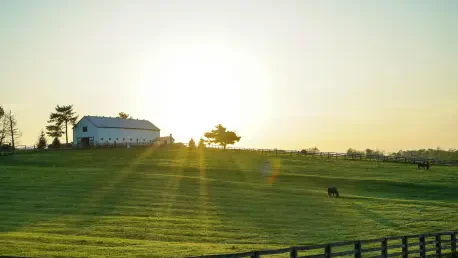In the heart of Kentucky, where rolling fields and rural communities form the backbone of the state’s identity, the Kentucky Agricultural Leadership Program (KALP) has quietly but powerfully transformed the landscape of agricultural leadership for four decades. Housed within the University of Kentucky’s Martin-Gatton College of Agriculture, Food and Environment, KALP recently celebrated its 40th anniversary, a milestone that underscores its enduring role in developing leaders equipped to face the ever-shifting challenges of farming and advocacy. This program, born from a critical need in the 1980s, has grown into a vital force, shaping individuals who not only sustain the industry but also amplify its voice in policy and innovation. As the agricultural sector continues to grapple with economic pressures and societal changes, KALP’s legacy offers a compelling story of resilience, adaptation, and empowerment, inviting a deeper look into how it has fortified Kentucky’s rural foundation over the years.
The Roots of KALP
Founding in Crisis
During the early 1980s, Kentucky’s agricultural sector found itself at a crossroads, battered by economic turmoil that included skyrocketing interest rates, dwindling export markets, and severe cash flow struggles among farmers. The state’s historically dominant crop, tobacco, faced intense political and economic scrutiny, threatening the stability of countless livelihoods. Amid this uncertainty, a looming leadership vacuum became evident as seasoned advocates aged out of active roles. Visionaries like Randall Barnett, then-associate dean at the Martin-Gatton College, and Dean Charles Barnhart recognized the urgent need for a structured initiative to prepare the next generation. Their foresight led to the creation of KALP, a program designed to equip emerging leaders with the tools to navigate an increasingly complex industry. This initiative was not merely a response to crisis but a proactive step toward ensuring agriculture’s future in the Commonwealth, addressing challenges that were unprecedented at the time.
The establishment of KALP during such a turbulent period highlighted a critical gap in agricultural leadership development across Kentucky. Farmers and rural stakeholders lacked a platform to cultivate skills for advocacy and strategic problem-solving, leaving the industry vulnerable to further decline. The program’s inception was driven by a clear understanding that economic and political pressures demanded more than traditional farming knowledge; they required leaders who could adapt to change and represent the sector’s interests on broader stages. By focusing on building resilience and foresight, KALP aimed to bridge this divide, creating a pipeline of individuals ready to tackle issues ranging from market fluctuations to regulatory shifts. This foundational vision set the stage for a legacy of empowerment, ensuring that Kentucky’s agricultural community would not just survive but thrive amid adversity through well-prepared leadership.
Early Partnerships
The launch of KALP was made possible through a pivotal partnership with Philip Morris USA, whose initial funding reflected a shared commitment to addressing the shrinking farm population and the diminishing pool of agricultural advocates. At a time when the disconnect between rural producers and mainstream society was growing, this collaboration underscored the necessity of fostering leaders who could effectively represent the industry’s interests. Larry Sykes, a key figure from Philip Morris USA at the time, emphasized the importance of cultivating voices that could bridge this gap, ensuring agriculture remained a priority in public and political discourse. This early support provided the financial backbone for KALP, allowing it to establish a framework for leadership training that prioritized both local relevance and broader impact, setting a precedent for future growth and sustainability.
Beyond financial backing, the partnership with Philip Morris USA brought a strategic alignment of goals that amplified KALP’s early success in Kentucky’s agricultural circles. The mutual recognition of the industry’s challenges—such as declining rural influence and economic instability—fueled a joint mission to empower individuals capable of navigating these issues with confidence and clarity. This collaboration enabled the program to attract participants from diverse agricultural backgrounds, creating a rich environment for learning and advocacy. The emphasis on building a unified voice for farming communities resonated deeply, laying a strong foundation for KALP to evolve into a respected institution. Over time, this early alliance proved instrumental in establishing the program’s credibility, ensuring it could focus on developing leaders who would carry forward the mission of safeguarding Kentucky’s agricultural heritage.
Program Design and Growth
A Unique Curriculum
KALP’s structure as a rigorous two-year leadership development initiative sets it apart, emphasizing experiential learning that immerses participants in the multifaceted world of agriculture. Co-directed by Steve Isaacs, Ph.D., and Will Snell, Ph.D., with support from coordinator Emily Roe Brown, the program integrates domestic and international travel to expose members to diverse practices and policies. For instance, the recently graduated Class 14 explored regions ranging from Kentucky’s own fields to Washington D.C., the Pacific Northwest, Vietnam, and Taiwan, gaining firsthand insights into global agricultural dynamics. This hands-on approach fosters skills like networking, advocacy, and strategic thinking, preparing participants to address complex challenges with a well-rounded perspective. By blending local issues with international contexts, KALP ensures its leaders are equipped to handle both regional concerns and broader industry trends.
The curriculum’s focus on collaboration and dialogue further distinguishes KALP among leadership programs in Kentucky, encouraging participants to engage with differing viewpoints and build consensus across commodity groups and policymakers. This design not only sharpens critical thinking but also cultivates a sense of shared purpose among diverse agricultural stakeholders. Participants learn to navigate intricate issues—whether economic, environmental, or regulatory—through immersive experiences that challenge preconceptions and broaden horizons. The program’s commitment to tailoring its content to real-world applications ensures that graduates emerge with practical tools for leadership, capable of making informed decisions that benefit their communities. This unique blend of theory and practice has solidified KALP’s reputation as a transformative force, consistently producing leaders who can adapt to the evolving demands of the agricultural sector with skill and confidence.
Evolving with the Times
Over its 40-year history, KALP has demonstrated remarkable adaptability, continuously updating its curriculum and travel destinations to reflect the shifting priorities of the agricultural industry. From exploring regions like Brazil, South Africa, and New Zealand in earlier years to focusing on current hotspots of innovation and policy, the program ensures its content remains relevant to contemporary challenges. This flexibility allows participants to engage with emerging trends, such as sustainable farming practices and global trade dynamics, preparing them to address issues that were unimaginable at the program’s inception. By staying attuned to the changing landscape, KALP maintains its role as a forward-thinking initiative, equipping leaders with the knowledge and perspective needed to tackle modern agricultural complexities with informed strategies.
This adaptability is not merely reactive but a proactive effort to anticipate future needs within Kentucky’s farming communities and beyond. The program’s ability to evolve ensures that each class engages with the most pressing issues of their time, from technological advancements to environmental concerns, fostering a mindset of innovation among participants. Coordinators and directors consistently refine the learning experience to incorporate feedback from alumni and industry experts, ensuring that KALP remains a step ahead in leadership training. This dedication to relevance has allowed the program to sustain its impact over decades, creating a legacy of leaders who are not only prepared for today’s challenges but also poised to shape the industry’s future. The emphasis on continuous improvement reflects a deep commitment to serving agriculture in a way that resonates with both current realities and long-term goals.
Lasting Impact on Leaders and Communities
Alumni Voices
The transformative power of KALP is vividly captured in the stories of its over 300 alumni, often described as the “who’s who” of Kentucky agriculture by co-director Steve Isaacs. Rod Kuegel, a livestock and crop farmer from Owensboro and member of the inaugural class, highlighted how the program provided networking opportunities and experiences that surpassed even his formal college education. This perspective reflects a common sentiment among graduates: KALP offers more than skill-building; it reshapes how individuals perceive their potential within the industry. Participants emerge with a renewed sense of purpose, equipped to lead with authority and insight, often crediting the program with opening doors to influential roles and connections that define their careers in agriculture.
Further illustrating this impact, Kristie Guffey, a Class 13 graduate and assistant professor at Murray State University, described KALP as a life-altering journey that reshaped her personal and professional outlook over an intensive 18-month period. Similarly, Heather Graham from Class 14 noted how the program instilled confidence, moving participants beyond self-deprecating labels like “just a farmer” to embracing their critical roles in the sector. These testimonials underscore a consistent theme of personal growth, where individuals gain not only practical tools but also the self-assurance to advocate for their communities. The diversity of experiences among alumni—from farmers to educators—demonstrates KALP’s ability to resonate across varied backgrounds, fostering a collective strength that amplifies its influence throughout Kentucky’s agricultural landscape.
Broader Influence
KALP’s impact extends far beyond individual transformation, significantly strengthening rural communities and the state as a whole through its robust alumni network. Graduates frequently assume pivotal roles in advocacy, policy-making, and industry innovation, ensuring that agriculture’s voice remains prominent despite a declining farm population. Their leadership helps bridge gaps between rural producers and urban policymakers, fostering dialogue that drives meaningful progress on issues like economic sustainability and land use. By placing trained leaders in positions of influence, KALP has created a ripple effect, where the benefits of its training permeate through local economies and state-wide initiatives, reinforcing the sector’s relevance in an increasingly urbanized society.
This systemic influence is further evidenced by the program’s emphasis on collaboration, which equips alumni to unite diverse agricultural groups under common goals, enhancing the industry’s collective bargaining power. Co-director Will Snell has noted how KALP’s graduates have profoundly shaped Kentucky’s rural fabric by championing causes that might otherwise be overlooked. Whether through legislative advocacy or innovative farming practices, these leaders ensure that the state’s agricultural heritage adapts to modern challenges without losing its core identity. The program’s focus on building networks of trust and shared purpose has cemented its role as a catalyst for community resilience, proving that well-trained leaders can effect change at both grassroots and governmental levels, sustaining the vitality of Kentucky’s farming legacy.
Looking Ahead
Future Vision
As KALP looks to the future, its commitment to nurturing agricultural leadership remains unwavering, with plans to welcome Class 15 in early 2026 marking the next chapter in its storied history. The program’s coordinators and directors, backed by Dean Laura Stephenson’s directive to listen and challenge, are focused on sustaining its legacy for another 40 years. This forward-looking approach is grounded in a strong alumni network and a proven track record of success, as noted by Steve Isaacs, who expressed confidence in KALP’s ability to adapt to emerging challenges. The ongoing dedication to preparing leaders for an ever-changing industry ensures that the program will continue to address critical needs, from technological integration to environmental stewardship, keeping agriculture at the forefront of Kentucky’s priorities.
This vision for the future also hinges on maintaining the adaptability that has defined KALP since its inception, ensuring that each new class engages with the most pressing issues of their era. By fostering an environment of continuous learning and innovation, the program aims to empower participants to anticipate and address challenges before they become crises. The optimism surrounding KALP’s trajectory is not merely aspirational but rooted in decades of tangible impact, where alumni have consistently risen to meet the demands of their time. As the agricultural sector faces uncertainties like climate change and market volatility, KALP stands poised to cultivate leaders who can navigate these complexities with skill and vision, securing a resilient future for Kentucky’s rural communities and beyond.
Sustaining a Legacy
Reflecting on the past 40 years, KALP’s journey reveals a steadfast dedication to addressing the leadership voids within Kentucky’s agricultural sphere, a mission that continues to resonate deeply today. From its origins amid economic hardship in the 1980s to its status as a cornerstone of leadership training, the program has adapted to every challenge with innovation and resolve. The voices of founders, industry partners, coordinators, and alumni weave a unified narrative of transformation, both personal and communal. Looking back, it’s evident that KALP catalyzed change by empowering individuals to lead with confidence, ensuring agriculture’s voice was never silenced. As it prepares for the next class in 2026, the focus remains on actionable growth—building leaders who will steer the industry through modern complexities with the same tenacity that defined its early days, offering a blueprint for sustained impact.









